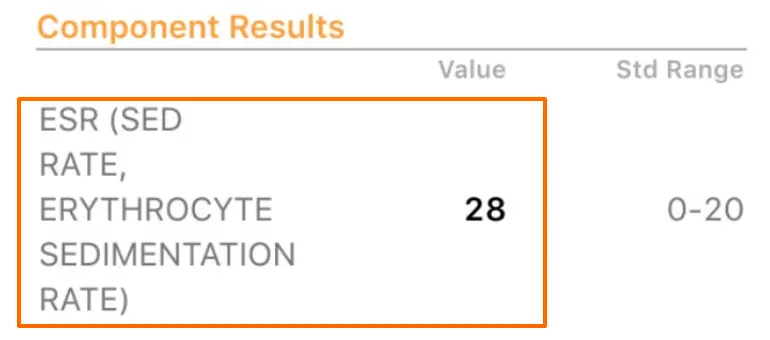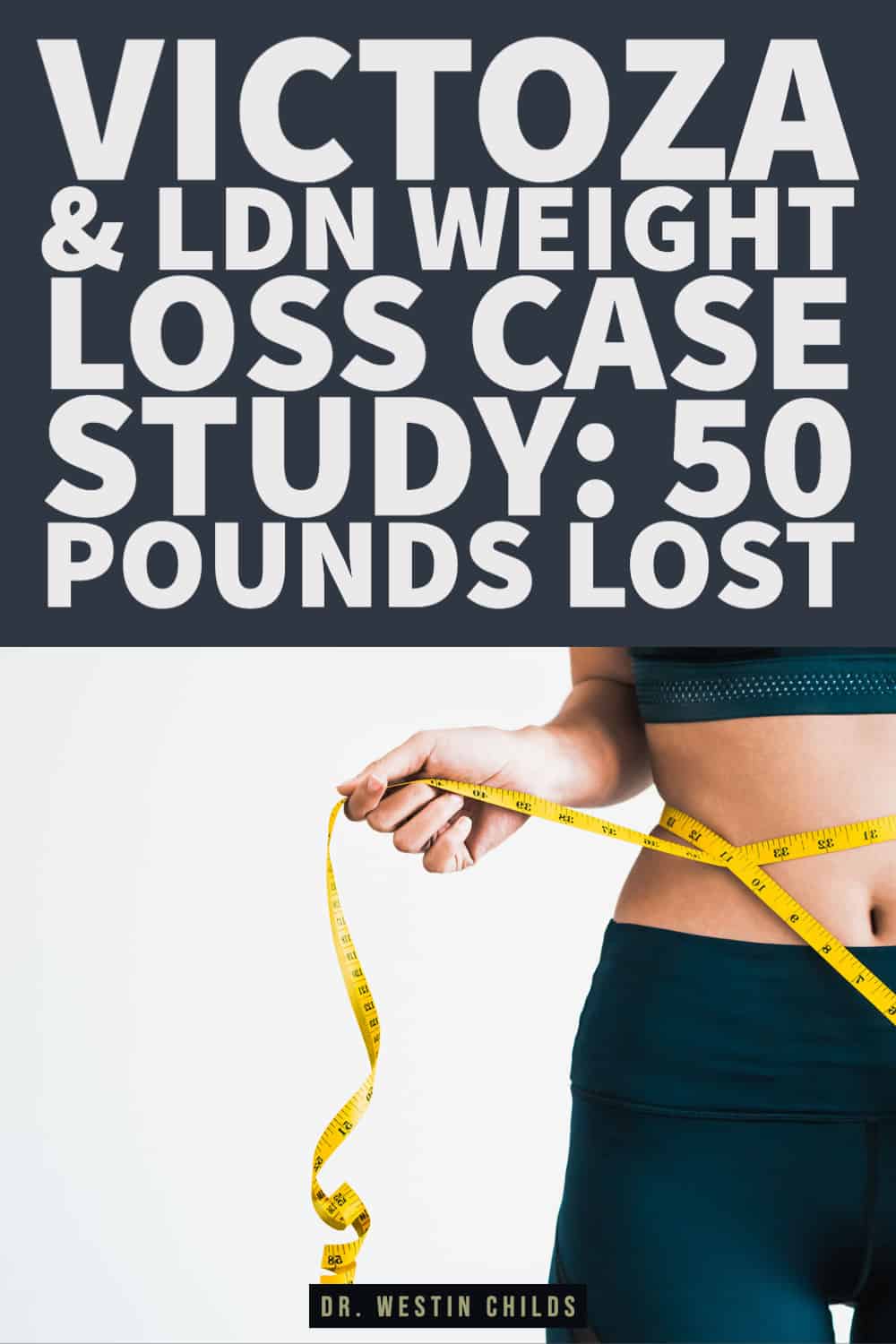Victoza is a powerful weight loss medication that actually works…
If used correctly.
And I will explain what I mean by that a little bit later, but first, we need to talk about this case study.
During this time she was able to lose almost 40 pounds using my hormone-balancing approach with the combination of Victoza + LDN + NDT and other hormones which we will discuss below.
You can see her email to me below…

Before we talk about how to lose this kind of weight when you have hormone imbalances like hypothyroidism or insulin resistance we need to talk about Victoza…
Update:

I am happy to report that this patient is now down another 10 pounds over the last month and is now down 50 pounds total thus far.
I suspect she will keep losing and I will update this again once I have some before/after pictures and more progress to report!
This new set of weight loss occurred without any changes to her treatment plan.
You can find more about using the same weight loss program that this patient used by clicking here.
Victoza Weight Loss Success: Does it Work?
For the benefit of those who are unfamiliar with Victoza let me give you a brief explanation of what it is.
Victoza is a prescription medication (FDA-approved for type II diabetes – but we will talk more about who else can benefit from this medication later) that targets the GLP-1 receptor.
Put another way the medication helps balance glucagon levels leading to more stable blood sugar levels.
So why do some patients lose a considerable amount of weight while using this medication?
In addition to the effects that it has on glucagon, it is also a powerful medication for lowering leptin levels and reducing insulin resistance.
If you’ve been reading the information on my blog you know that these two hormone imbalances (along with thyroid resistance) cause the vast majority of weight gain and weight loss resistance in MANY patients, especially hypothyroid patients.
So naturally as you fix these hormone imbalances patients will tend to lose weight…
But, and this is a big but…
ONLY if the medication is used correctly, in the right dose, and if used in conjunction with other hormones and medications.
If you are thinking that just getting this prescription from your Doctor will help lead to significant weight loss, think again.
That’s not how it works.
Instead, you need to take a very systematic approach that looks at all hormones, nutrients, and other conditions that make weight loss almost impossible.
So to answer the question:
Yes, Victoza can help lead to weight loss (this case study is a great example) and there are many studies that show that to be the case (1)…

But for the best results possible (and to lose more than just 5-10 pounds) this case study outlines the BEST approach to take.
Review of Case Study + Labs & More
Let’s use this patient as an example (if you have your labs you are welcome to follow along).
This particular patient presented with the following:
- History of hypothyroidism which was later diagnosed as Hashimoto’s thyroiditis – even with this diagnosis she remained symptomatic despite taking thyroid hormone
- Weight gain and the inability to lose weight (despite eating very healthy with regular exercise) – she gained a considerable amount of weight AFTER pregnancy
- Menstrual irregularities and a history of infertility throughout her life (she previously underwent IVF)
- Failed lap band surgery – she originally got down to 180 after the procedure but gained back her weight over time
- And issues with fatigue, insomnia, and mood irregularities
Over time I’ve seen many patients who fall into similar categories.
Most of the time they feel like they are a lost cause, like nothing that they do will ever help fix any of their problems, and that they are stuck feeling this way forever.
Do NOT feel this way.
I am only highlighting this patient’s history to show you that even patients who have had gastric bypass (or any of the other complex issues this patient had) can lose a significant amount of weight and start feeling better.
Many conventionally trained doctors would look at this case and probably send them back for another gastric bypass surgery or revision, but I can almost guarantee if it didn’t work the first time it most likely won’t work the second time.
So what are you supposed to do if you fall into this category?
What do you do if you feel like you are being blown off by your Doctor or that they are “missing” something?
The first step is to take a very close and comprehensive look at hormone levels…
Comprehensive Lab and Hormone Review
I say this is one of the most important steps because it’s the FIRST and many Doctors don’t order all of the tests that you need.
Believe it or not many PCPs and even endocrinologists don’t order hormone levels like estrogen, progesterone, testosterone, insulin, leptin, etc.
Nowadays endocrinologists focus mostly on hypothyroidism (with T4 medication only) and on type II diabetes.
Doctors do NOT get trained on bioidentical hormone replacement therapy in residency or in medical school so it’s up to them to learn this information on their own – and many don’t take the initiative or have an interest.
With that in mind, make sure you get a COMPLETE hormonal panel otherwise you won’t be able to put the story together to figure out what is going on.
Beyond just simply testing for these hormones you also need to make sure that your provider understands the difference between normal and “optimal” thyroid levels.
You can read more about this issue in regard to TSH and how it is inaccurate in assessing thyroid status in many patients in this post.
Let’s look at the hormone status of this particular patient…
Properly evaluating Insulin and Blood sugar levels
Since we are talking about Victoza here let’s start with insulin levels:

This patient has a 12-hour fasting insulin of 9 with a reference range of 3 to 28.
What’s important about this number is that in the fasted state your insulin should be less than 5.
Anything higher indicates some degree of insulin resistance.
In a patient with weight gain (or in any hypothyroid patient), insulin should be aggressively treated.
As a hormone, insulin signals the body to store calories as fat (2) (even if those calories are restricted) and to grow fat cells.
Unfortunately, many Doctors prefer to order the Hgb A1c which is an estimate of blood sugar in the body – but it falls short in many cases.
Using fasting (and even postprandial) insulin levels allows you to find insulin resistance early and treat it aggressively.
*Note: If you ignore (or don’t check for insulin resistance) it will be VERY difficult if not impossible to have significant weight loss.
Properly evaluating thyroid function:
This is another big one and it is missed frequently by both providers and patients.
For an in-depth analysis of how to understand thyroid labs, I recommend you read this post.
Let’s look at this patient’s labs:

The first thing you will notice is a TSH of 7 with a reference range of 0.3 to 5.0.
Without looking at any other thyroid lab tests I can tell you that hypothyroidism (or low thyroid hormone) is contributing to her weight gain and her overall situation and she would benefit from thyroid hormone replacement.
Remember there is a huge difference between being “normal” and “optimal” when it comes to the thyroid and it will be made more clear by looking at the other lab tests.
The next thing you will notice is that her Free T3 is suboptimal and her Free T4 is at the very low end of the reference range:


Her free T3 is 2.3 with a range of 1.7 to 3.7 and her free T4 is 0.7 with a range of 0.7 to 1.9.
Both of these numbers are low indicating that the amount of active and available thyroid hormone circulating in her blood is ALSO low.
And this is yet another indication that she should be given thyroid hormone.
Properly evaluating Testosterone levels:
The next step is to check all sex hormones including estrogen, progesterone, and testosterone.
In this particular patient, her progesterone/estrogen levels were actually relatively normal but her testosterone was at the very low end of the reference range:

Her free testosterone (remember this is the testosterone that your body can actually use) was 0.14 with a reference range of 0.06 to 0.98.
Her total testosterone was 8.5 with a range of 8 to 60.
You can clearly see that while she is technically in “range” she is at the bottom 5% of that reference range.
Low testosterone contributes to poor mood, increased irritability, decreased sex drive, and inability to build muscle mass in women.
Every woman (like every man) will go through andropause at some point in their life, usually around menopause.
In cases of insulin resistance testosterone levels drop down much quicker and cause symptoms of andropause at any age.
Much like insulin and thyroid hormone, there is a “normal” and “optimal range”.
Properly evaluating inflammation and autoimmunity:
Checking for inflammation and autoimmunity can be both easy and complex.
In the case of hypothyroidism, it is always worth checking both thyroid antibody tests to make sure the cause of hypothyroidism is not autoimmune thyroiditis.
Non-specific inflammatory markers like CPR and ESR can be used as a general assessment of inflammation in the body which can then prompt further investigation if necessary.
In this patient, her TPO antibodies were quite high:

She did have a history of Hashimoto’s so this wasn’t necessarily a surprise, but it does change the management and treatment so it is very helpful to know.
While the total antibody level is not necessarily important her value was 1317 with a reference range of less than 6.
Couple that with her non-specific elevation of ESR and we have a scenario where she might have active autoimmunity.

You can see her ESR is 28 with a reference range of 0-20.
The higher the ESR the more inflammation present.
So let’s recap what we are dealing with:
- Insulin resistance as evidenced by a high fasting insulin
- Hypothyroidism (with an autoimmune component) as evidenced by her thyroid lab tests
- Low testosterone as evidenced by her testosterone levels
- Autoimmunity and inflammation as evidenced by her elevated ESR and TPO antibodies
So how do all of these abnormalities fit together?
As I’ve mentioned before all of these abnormalities are connected and just treating one won’t necessarily bring balance to the whole system.
Let me give you an example:
Insulin resistance can lead to low testosterone levels (3).
Hypothyroidism can lead to reduced insulin sensitivity (4).

Inflammation can lead to decreased thyroid hormone conversion (5).
Autoimmunity can worsen thyroid function (6).
Low testosterone, insulin resistance, and hypothyroidism all encourage a metabolic condition that leads to weight gain and weight loss resistance.
The answer isn’t to go after just one of these, but instead to go after ALL of them.
What does this kind of treatment plan look like?
Below I’ve matched the condition above with the treatment that this particular patient received:
- Hypothyroidism -> WP thyroid (natural desiccated thyroid hormone) which is a combination of both T4 thyroid hormone and T3 thyroid hormone
- Inflammation and autoimmunity -> Low dose naltrexone
- Weight loss resistance and body set point malfunction -> Low dose naltrexone
- Insulin resistance -> Victoza (GLP-1 agonist)
- Low testosterone -> Bioidentical and transdermal testosterone replacement
- Nutrient deficiencies from previous lap band -> Combination of liquid iron, vitamin B12, zinc, melatonin, fish oil, and curcumin
There are a few things that I need to point out:
1. Realize that each and every patient is unique so what worked for this patient may not work for you (even if you have similar lab values).
2. In order to get the results like this patient did you need to address ALL of your problems (I wasn’t able to go over her entire treatment plan in this post so some things have been left out).
3. In order to get this type of treatment, you need to make sure you see a provider who focuses on hormones, weight loss, and weight loss resistance. You will not get this type of care from a primary care provider or even an endocrinologist.
4. This isn’t the only way to get these kinds of results. This treatment may have worked with different types of thyroid hormone, GLP-1 agonists, etc. Use this as a guide to give you an idea if you are even on the right track or if you need to find further help.
Using Victoza by Itself will NOT lead to Significant Weight Loss
While Victoza is a helpful medication it won’t work by itself and without the addition of other hormones/medications as indicated above.
When you are being evaluated by a physician or provider make sure you are being tested for these 3 hormone imbalances:
1. Thyroid resistance (that means you need a full thyroid panel)
2. Insulin resistance (check fasting insulin levels)
3. Leptin resistance (check fasting leptin level)
These 3 conditions are by far the most under-appreciated and under-diagnosed conditions leading to weight loss resistance that I see.
How do you check for these conditions?
I’ve included a hormone testing guide for you below, so make sure you are being evaluated with ALL of these tests.
*Remember I didn’t include all of the labs from this patient only the pertinent labs, but I did test for all of these.
- Full thyroid panel: TSH, free t3, free t4, reverse T3, sex hormone binding globulin, thyroid antibodies
- Full hormone panel: Progesterone, estradiol, testosterone free and total, DHEA
- Leptin levels: fasting serum leptin levels
- Insulin levels: fasting insulin levels, Hgb A1c, and fasting serum glucose
- Sex hormones: estradiol, progesterone, testosterone, sex hormone binding globulin
- Adrenal status and hormones: serum cortisol, cortisol binding globulin, DHEA, and sex hormones
- Nutrients and other markers of nutrient deficiencies: Vitamin B12, Vitamin D, Iron, Ferritin, MCV, homocysteine, folic acid
If your provider isn’t willing to order these tests then it’s probably best to find someone who is not only willing to order them but who also understands how to interpret them.
These tests will give you a great starting point, but they don’t necessarily give you an idea about what treatment is necessary.
Who Else Can Benefit from Using Victoza: Using Victoza off-Label
We brushed on how Victoza works, but let’s spend some more time on it now.
Victoza and other GLP-1 agonists work by targeting and reversing insulin and leptin resistance which can accelerate weight loss efforts.
But there is one big problem:
The medication is FDA-approved for the treatment of type II diabetes.
That means most providers aren’t willing to prescribe this medication unless you have type II diabetes which is typically diagnosed by the Hgb A1c.
Even then it is not considered first-line therapy for type II diabetes.
This is unfortunate considering this medication tends to be far more effective than metformin at reducing blood sugar and helping patients with weight loss.
Another glaring problem is the fact that hgb A1c isn’t the most accurate test for assessing insulin resistance due to its many flaws (7).
Furthermore, I’ve seen a growing population of patients who have elevated fasting insulin levels with suboptimal Hgb A1c (although not in the range of type II diabetes) which precludes them from receiving this medication.
Even though Victoza is FDA-approved for type II diabetes it has a benefit outside of just insulin resistance which I will go over below:
Victoza for Patients with PCOS
One day I will write a post about PCOS because it doesn’t get as much attention as it should, but for now, I will be somewhat brief.
PCOS is really a name given to a combination of hormone imbalances that are characterized when a woman experiences certain symptoms.
The underlying hormone imbalance seen in this population of patients includes high testosterone (usually high free testosterone), normal to high DHEA levels, high estradiol levels and low progesterone levels, high insulin, and high blood glucose levels, and usually some degree of hypothyroidism.
This combination of hormone imbalances leads to weight gain, hormonal acne, changes to mood (including depression, anxiety, and irritability), changes in the menstrual cycle (PMS, PMDD), and in some cases infertility.
One of the biggest issues with PCOS is the lackluster treatment options available to these patients.
That’s too bad considering that studies have shown that the combination of metformin plus Victoza leads to significant weight loss in patients with PCOS (8) and can help reduce androgen levels.
What is also interesting is that many patients have failed metformin therapy by itself but when Victoza is added to metformin patients do experience weight loss even when used for a short period of time (9).
This would indicate that this medication is likely working through a separate mechanism than what we already know (or we don’t completely understand PCOS).
In either event – Victoza can be very useful in treating women with PCOS both in helping them lose weight and in reducing PCOS-like symptoms.
Victoza for patients with Leptin Resistance
We aren’t done yet…
Victoza (and other GLP-1 agonists) can help sensitize the body to leptin.
This is great news if you have Leptin resistance because traditionally there hasn’t been much in the way of treatment for this serious condition.
If you aren’t aware of leptin resistance basically it makes weight loss almost impossible because your hypothalamus sets the metabolism and energy output of your body at a very low rate.
That means your metabolism goes down, your thyroid function decreases and your body is put in a position where weight loss is impossible.
Victoza does 2 things to help with Leptin resistance:
1. It helps sensitize the body to leptin at the cellular level (10) thereby reversing leptin resistance.
2. It attenuates the increase in leptin levels (11) that is seen after patients lose weight. That means you get to keep OFF the weight that you lost.
Most people following the calorie in calorie out model of weight loss will have no doubt noticed that they might be able to lose some weight initially but it almost always comes back over time.
One thing they probably didn’t realize is that this weight gain is in part caused by higher leptin levels and leptin resistance that occurs after calorie restriction.
Of course, there are other factors like decreasing T3 levels and increasing reverse T3 levels that contribute to this weight gain, but a huge player is the hormone leptin.
This is one of the main reasons why calorie-restricted dieting fails over 99% of the time.
It has nothing to do with calories and everything to do with hormone imbalances that occur as a result of the calorie restriction.
In fact, one of the main causes of leptin resistance is a history of recurrent yo-yo dieting, calorie-restricted dieting, and diets like the HCG diet.
Most patients who have a significant degree of leptin resistance are usually unaware of the condition because most providers don’t check for serum leptin levels (mostly because they don’t know how to treat/interpret the results).
Victoza for Non-Diabetics (And Diabetics)
Does Victoza work if you don’t have diabetes?
Yes, absolutely – especially if you have leptin resistance or metabolic damage from persistent dieting.
Studies have shown that using GLP-1 agonists in overweight non-diabetic women can lead to significant weight loss (12) in a specific subset of patients.
It turns out that some patients are more receptive to weight loss when using Victoza and other GLP-1 agonists if they aren’t diabetic.
There are two groups:
Quick responders and those who don’t respond at all (I’m talking about non-diabetics here as it relates to weight loss).
Quick responders lost up to 20 pounds within 1-2 months whereas the non-responders didn’t lose any weight.
The difference between the two groups had something to do with leptin but the results of the study aren’t conclusive.
In my clinical experience, non-diabetic patients with high fasting insulin levels (but normal Hgb A1cs) and high fasting serum leptin levels tend to be in the “quick responder” group.
On the other end of the spectrum, I’ve even had some highly insulin-resistant patients NOT respond to Victoza or other GLP-1 agonists.
The point is that Victoza and other GLP-1 agonists aren’t miracle medications for weight loss, but they can work quite well in specific subgroups of the population.
The biggest downfall to this medication is the fact that it is FDA-approved for type II Diabetes only and that the medication by itself is quite expensive.
That means insurance companies aren’t very willing to cover the medication for off-label uses (unless you know a few tricks).
Side Effects when using Victoza
The biggest side effects that most patients are concerned about include pancreatitis and pancreatic cancer.
Early studies (13) showed some increased risk of pancreatitis in patients who had a history of pancreatitis in the past.
In addition, there was some concern over an increased risk of developing pancreatic cancer using this medication.
Since then more studies have surfaced that don’t show an increased risk of either (14).
In general, as long as the medication is used temporarily (used to reverse insulin and leptin resistance) then the risk of long-term complications and adverse side effects is very low.
The most common (less serious) side effects from Victoza include:
- Nausea (usually without vomiting)
- Headaches
- Sensation of dizziness or feeling faint
- Decreased appetite or sensation of feeling “full”
- Flu-like symptoms
- Feeling fatigued or “run down”
These symptoms usually subside after 1-2 weeks of using the medication.
In some instances, the side effects are so severe that they preclude patients from using the medication altogether.
If that happens to you then you can try a different type of GLP-1 agonist.
Recap & Final Thoughts
I hope you’ve found this case study helpful and informative.
I’ve had some instances where patients take these case studies to their Doctors and ask to be treated in a similar way.
I don’t recommend this approach for several reasons:
1. This patient is NOT you (you are unique)
2. I’m never able to provide all of the specifics of each patient in a case study so there is a lot of information that is left out and makes the story incomplete
3. Many of the therapies referenced here require advanced knowledge of hormone replacement therapy and/or the use of medications off-label
At the end of the day, I want to drive home that there are advanced weight loss therapies out there that can help even the most weight-loss-resistant patients lose weight.
Don’t feel like your case is hopeless or that you are out of options.
Victoza is one of those newer therapies that can be very effective in a certain subgroup of the population but finding and understanding who benefits from it can be difficult without an understanding of hormone balance.
Now it’s your turn:
Have you used Victoza in the past?
Did it help you lose weight?
Why or why not?
Leave a comment below!
Scientific References
#1. https://www.ncbi.nlm.nih.gov/pubmed/26284720
#2. https://www.ncbi.nlm.nih.gov/pmc/articles/PMC4087161/
#3. https://www.ncbi.nlm.nih.gov/pubmed/18319314
#4. https://www.ncbi.nlm.nih.gov/pmc/articles/PMC3356957/
#5. https://www.ncbi.nlm.nih.gov/pmc/articles/PMC3608008/
#6. https://www.ncbi.nlm.nih.gov/pubmed/3066320
#7. https://www.ncbi.nlm.nih.gov/pmc/articles/PMC3912281/
#8. https://www.ncbi.nlm.nih.gov/pmc/articles/PMC4812364/
#9. https://www.ncbi.nlm.nih.gov/pmc/articles/PMC3922503/
#10. https://www.ncbi.nlm.nih.gov/pmc/articles/PMC4386791/
#11. https://www.ncbi.nlm.nih.gov/pmc/articles/PMC4424381/
#12. https://www.ncbi.nlm.nih.gov/pmc/articles/PMC3241299/
#13. https://www.ncbi.nlm.nih.gov/pubmed/21487080
#14. https://www.ncbi.nlm.nih.gov/pubmed/24199745








